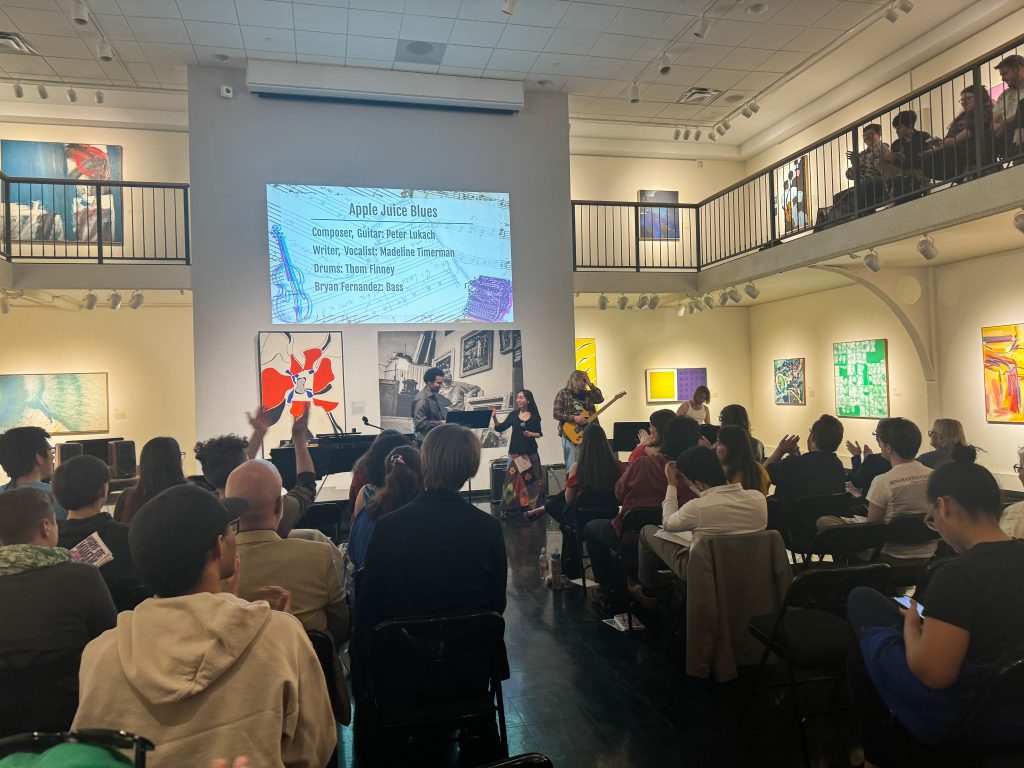The music and creative writing departments joined for their third-annual collaboration, Word of Mouth, at the Binghamton University Art Museum on April 25.
Friends, families and acquaintances of the poets, composers and singers began filing into the Art Museum as early as a half hour before the event commenced. Foldable black chairs were arranged in the main area of the gallery as well as on the overhead balcony. A piano, music stand and other arrangements were set for the performances.
The event started at 5 p.m. with Tina Chang, the director of creative writing, taking center stage as she welcomed the audience and was also joined by Daniel Thomas Davis, an associate professor of music.
“In those early days, we were masked but eager to begin engagement with one another, after having been in lockdown for a good part of the year,” Chang said. “When we first met … [Davis] told me that composers needed words. He asked me if students had words, and I said, ‘we definitely do.’ And like all great collaborations, it started that simply. We had our first meeting of the minds where poets and composers gathered in a room to share creative material [by] playing two minute pieces and reading one page poems. From that point forward, I really did feel like something magical was taking place.”
Word of Mouth began with the piece “A.I.daption,” written by Alycia Calvert, a second-year Ph.D. candidate in English, and composed by Liam Frager, a second-year graduate student studying music. Vocalist Daisy Lawrence, a third-year master’s student studying music, (1) rose from her seat in the audience — capturing everyone’s attention with her strong vibrato and robotic performance, which connected with the theme of the composition. 19 pieces were performed at Word of Mouth — 10 of which were performed in the first half of the event.
Kyle McAfee, a junior majoring in music and the composer for the third piece of the event, “Tonight I Do,” spoke of his collaborative process with his writer.
“It’s just going off what the poet sends me,” McAfee said. “They wrote the poem during the process, so it was a matter of [figuring] out what kind of tone [and] mood we wanted with the piece. I just started writing sketches, setting the words [and] jumping right into it. And then from there, it’s just expanding on the things we’ve already written.”
Each composition was performed by a vocalist, either as a solo, duet or trio. The poem McAfee composed was at one point called “Vice,” as it was about having a vice and how one resisted it before eventually letting go.
“I really went for something kind of eerie [and] unsettling, because there’s a lot of conflicted feelings involved,” McAfee said. “It’s not very stable. But the ending kind of ends a bit more brighter [and] pleasant, because there’s [this] sort of a firmness that you do want to engage in these things, and you’re letting yourself go.”
“Thoughtful Exchanges,” written by Ellie Shuart, one of the vocalists and a junior majoring in English, was well-received by the audience for its creativity, composition and sense of humor. Shuart also shared her experience with music growing up — such as playing the cello and being part of a choir — and how much she enjoyed combining it with creative writing.
“Singing something that I wrote felt way more vulnerable than anything I’d sung before.” Shuart wrote in an email. “If people didn’t like it, it’s a lot more personal that way, you know? When the audience did enjoy it, though, it made it so much better. It was also really fun to have complete creative control over things.”
At 6:05 p.m., a short intermission was observed when the audience interacted with the performers. Ten minutes later, the event resumed, with the remaining 10 compositions performed. Each performance was met with resounding applause as the writers and composers joined the vocalists in taking a bow.
Grigory Stanskiy, the writer of “A Walk On Campus, Pt. 1” and an international exchange student studying English, explained how the collaboration with the music department influenced his writing style.
“In poetry the sound is [important], but not the only thing to consider,” Stanskiy wrote in an email. “This collaboration really brings the text on stage and into the real world. It becomes a performance. This is very unique and interesting, and [it] makes me think more about the ways how the poem is presented and not how it looks on paper … at the end, it is really not just music to poetry — it’s a new piece made of words and sounds.”



